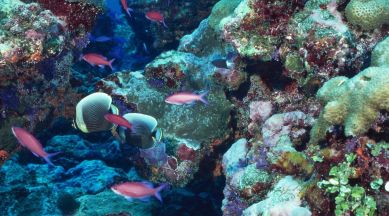Researchers develop AI tool to monitor coral reef health from space
Researchers have developed a set of sophisticated deep learning algorithms that could be used to identify and monitor coral reefs.

Apart from being visually stunning, coral reefs are an important part of the ecosystem under the ocean. They protect coastlines from erosion and can support more species per unit area than any other marine environment.
But changing water temperatures, ocean acidification, pollution, invasive species, changes in weather patterns and other impacts are damaging coral reefs around the world, according to the United States National Oceanic and Atmospheric Administration. (NOAA) The world has already lost 30 to 50 per cent of its coral reefs already.
As part of conservation efforts, researchers at the University of Hawai’i at Manoa have developed an artificial intelligence technology that can be used to identify and measure coral reefs from space.
They do this by monitoring “reef halos,” also known as grazing halos or sand halos. Reef halos are made of ring-like patterns of bare sand that are found around patch reefs. Their presence is visible from satellite images.
These features, also known as grazing halos or sand halos, consist of ring-like patterns of bare sand that occur around coral patch reefs, and their presence is readily visible from satellite images.
“Reef halos may be important indicators of the health and vitality of coral reefs, but until now, their measurement and tracking has been a challenging and time-consuming process,” said Simone Franceschini, lead author of the study published in the journal Remote Sensing of Environment, in a press statement. Franceschini is a postdoctoral research fellow at the Madin Lab in the Hawai’i Institute of Marine Biology.
Computer vision technology has improved massively in the recent years, with systems getting so advanced that they even allow a limited version of self-driving technology by identifying objects on the roads in real-time.
But even though AI has performed very well in various fields of image analysis, the identification of reef halos was a challenge. They exhibit complex ecological patterns with a lot of variation. This challenge required combining different deep-learning algorithms.
According to Franceschini, reef halos are sometimes clear with distinct edges and high contrast but sometimes, they are quite faint and hard to distinguish.
The researchers took this diversity of patterns into account and developed a set of algorithms that are capable of accurately identifying 90 per cent of halo in some parts of the world, according to the university.
Now, the researchers plan to develop a free web app that will allow conservationists, scientists and resource managers to quickly monitor aspects of reef health remotely using satellite or drone imagery.